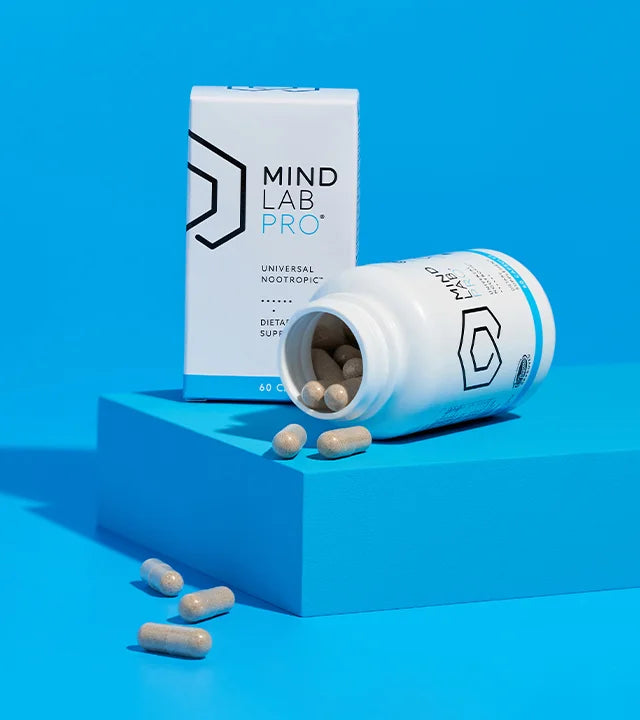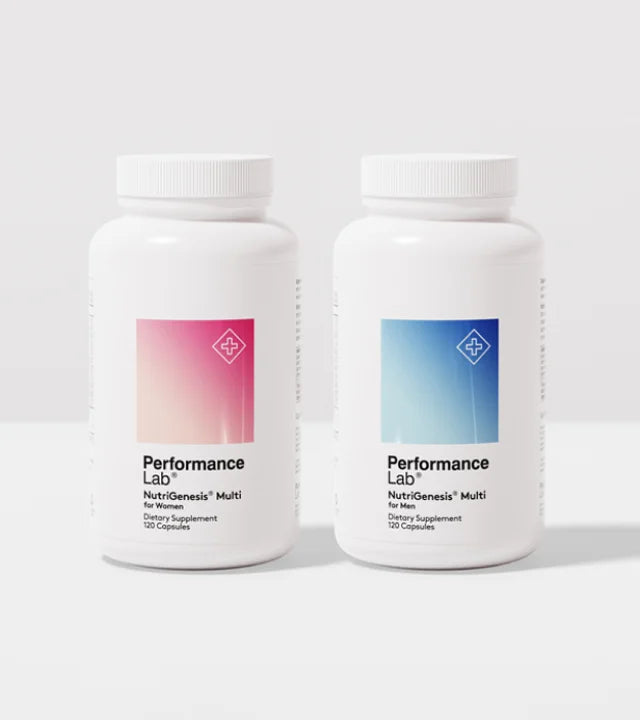Vitamin B9, also known as folate (or folic acid in its synthetic form), is a water-soluble B-vitamin that supports healthy function across several body systems. While it’s best known for preventing birth defects, Vitamin B9 is also key for brain function, cardiovascular health and mood balance.
In this article, we explore the unique impact of B9 on the brain, its nootropic potential, and other key health benefits associated with this essential vitamin. Let's get to it!
Key Takeaways
- Vitamin B9 is also called folic acid (synthetic) or folate (natural)
- Folate is found mostly in plant-based foods like lentils, asparagus, spinach and other dark green leafy vegetables
- In supplements, B9 is found in prenatal formulas, multivitamins, brain & nootropic supplements, sport nutrition products, caffeine stacks and other categories.
- As a nootropic, B9 supports brain chemicals for mood and mental clarity
- Low vitamin B9 levels may be linked to cognitive decline and mood disorders
- Folate protects blood vessels and circulation, supporting healthy blood flow
- Its protective effects on blood flow contribute to brain and heart health
- L-methylfolate is the bioactive form; most effective for the brain
What is Folate?

Vitamin B9, also known as folate (or folic acid in its synthetic form), is a water-soluble B-complex vitamin essential for DNA synthesis, red blood cell formation, and healthy cell division.
It plays a vital role throughout life. Starting with supporting fetal development during pregnancy, right through maintaining cognitive and cardiovascular health in adulthood.
While naturally found in leafy greens, legumes, and certain fruits, B9 is also widely used in fortified foods and dietary supplements. Let's get into folate health benefits next, with an emphasis on its role as a brain-boosting nootropic.
Vitamin B9 for the Brain
As a nootropic for cognitive performance and brain health, Vitamin B9 works by:
- Supporting robust and healthy circulation, including blood flow to the brain
- Helping form neurotransmitters (also called brain chemicals) that regulate mood, memory and mental performance.
These bioactivities optimize brain health for long-range memory and mental performance. Let's take a closer look at how Vitamin B9 may help with brain function.
Brain Circulation + Brain Protection

One of B9's greatest areas of support (especially in combination with B-Complex vitamins) is helping the body to manage homocysteine. Elevated levels of the amino acid homocysteine in the bloodstream can negatively impact blood circulation by:
- Increasing vascular oxidative stress. This refers to higher levels of a type of free radicals called Reactive Oxygen Species (ROS) that bombard and damage cell membranes, leading damage.
- Irritating and damaging endothelium: blood vessel linings
- Disrupting blood clotting pathways
Elevated homocysteine disrupts the healthy blood flow that is key for cognitive performance.(1-3)
High homocysteine levels have been linked to blood vessel damage, especially in the brain; this may interfere with cerebral circulation and cognitive function. Research shows that folate deficiency correlates with high homocysteine, which in turn is associated with memory problems, brain atrophy, and vascular dementia.
High homocysteine levels correlate to low B9 intake;(4) both of which are tied to cognitive decline and unhealthy changes to brain structure.(5)
Vitamin B9 as folate helps to convert homocysteine to methionine – helping to protect the blood-brain barrier's microvascular and maintain blood homocysteine levels in a normal range associated with brain health and sharp mental performance.(6)
B6, B9, and B12: A Synergistic Trio for Homocysteine Reduction
Folate is good for regulating homocysteine, but when combined with Vitamin B9 and Vitamin B12 it may work even better. These three Bs team up on homocysteine via interrelated biochemical pathways. This complementary activity of B6, B9 and B12 enhances the effectiveness of lowering homocysteine levels.
In supplement form, Vitamins B6, B9 and B12 have been shown to effectively reduce blood homocysteine levels.(7)
Research: A review of eight large-scale randomized trials including 37,000 individuals found that combined supplementation with folic acid, B6, and B12 significantly reduced homocysteine. While this did not improve cardiovascular event rates, researchers reported the improvements for vascular integrity and brain health were substantial in folate-deficient groups.(8)
Research: A meta-analysis of 12 clinical trials involving over 1,100 participants found that supplementing with 0.5 mg of folic acid reduced homocysteine levels by 25%. Adding 0.5 mcg of Vitamin B12 provided an additional 7% reduction.(9) These findings suggest B9 supplementation -- especially when paired with B6 and B12 -- may significantly improve vascular and cognitive health.
Low Vitamin B9 (as folate) and high homocysteine levels are modifiable risk factors for poor mental performance and cognitive decline, in part because high homocysteine interferes with healthy cerebrovascular function.
Brain Chemicals for Mood
As natural folate, Vitamin B9 efficiently converts into L-Methylfolate, the active nootropic form that enables the production of three important brain chemicals: Serotonin, norepinephrine and dopamine.(10) This activity also supports the production of SAMe (S-Adenosyl-methionine), a compound tied to serotonin known for mood-enhancing and cognitive benefits.(11)
Learn about nootropics for mood.
Low folate levels have been linked to depression, with researchers suggesting folate supplementation may help by promoting healthy serotonin levels.(12)
Research: A 2023 review reported that people with depression often have significantly lower folate levels. They also noted that folic acid and L-methylfolate supplementation appear to improve depressive symptoms, especially when used as adjuncts to antidepressant therapy.(13) Another systematic review and meta-analysis found that folic acid supplementation significantly reduced depression scores across multiple randomized controlled trials. The benefit was found to be greater in longer-term supplementation (studies lasting over 10 weeks).(14)
L-methylfolate has also shown effectiveness in individuals with treatment-resistant depression, especially those with MTHFR gene mutations, according to a meta-analysis.(15) This bioactive form (L-methylfolate) bypasses folic acid's less efficient conversion processes and instead enhances neurotransmitter production directly in the brain. We'll get more into MTHFR mutations in a moment.
Other Health Benefits of Vitamin B9

Pregnancy
Vitamin B9 may be most widely recognized for its role in pregnancy and fetal development. Getting enough folate before conception and during early pregnancy is crucial to reduce risk of birth defects like neural tube defects (NTDs) such as spina bifida. One 2010 systematic review estimated that daily folic acid supplementation could reduce the occurrence of neural tube defects by up to 70%, highlighting its critical role in maternal and infant health.(16)
Heart Health
Folate's regulation of homocysteine helps brain health, but is equally helpful for overall cardiovascular health. High homocysteine levels are linked to damage to endothelium (the lining of blood vessels), hardened arteries, blood clots. One 2007 meta-analysis found that folic acid supplementation reduced the risk of stroke by 10% and overall cardiovascular disease by 4%, especially in populations where fortified foods (such as fortified breakfast cereals) are not widely available.(17)
Cell Division
Vitamin B9 is essential for DNA synthesis and cellular replication. These processes are very important for rapidly dividing cells, such as those in bone marrow, skin, and the gastrointestinal tract. One review linked folate deficiency to impaired cell renewal and impaired tissue repair. It's a bigger picture benefit: Getting enough folate supports not only blood health but also cellular maintenance and regeneration throughout the whole body.(18)
Consequences of B9 Deficiency
We've touched upon how Vitamin B9 deficiency can carry health risks. Let's now round up the most important folate deficiency concerns to consider:
- Anemia: Impaired DNA synthesis produces abnormal red blood cells instead of healthy red blood cells, potentially resulting in fatigue, weakness, and shortness of breath.
- Neurological issues: Evidence suggests B9 deficiency is associated with irritability, forgetfulness, poor concentration, and in severe cases, cognitive decline.
- Pregnancy issues: In pregnant women, folate deficiency significantly increases the risk of neural tube defects in the developing fetus.
- Elderly concerns: Elderly populations have increased risk of high homocysteine and related heart disease and dementia concerns. Mental health issues like depression and apathy are also more common in elderly with low folate levels, especially when B12 is low, too.
Because folate plays such a crucial role in methylation, cell division, and neurotransmitter synthesis, long-term deficiency may impair everything from immune function to mood stability. Early identification and correction to achieve healthy folate intake, including with vitamin supplementation, are critical.
Recommended Daily Allowance (RDA)
The RDA for adults is 400 mcg of dietary folate equivalents (DFE) per day. Pregnant women require 600 mcg DFE. Many supplements use L-methylfolate for enhanced bioavailability, especially in individuals with MTHFR gene polymorphisms.
Populations at Risk of B9 Deficiency
- Older adults (due to absorption issues)
- Pregnant women (higher folate demand)
- Individuals with MTHFR gene variants (reduced folate metabolism)
- People who consume too much alcohol (alcohol interferes with absorption)
MTHFR Gene Mutation and Folate Metabolism
About 40% to 60% of the population carries a variant of the MTHFR gene (methylenetetrahydrofolate reductase) that makes it harder to convert synthetic folic acid into its active form, L-methylfolate. This can lead to elevated homocysteine levels and lower circulating folate levels, increasing the risk of cardiovascular problems, mood disorders, and neurological issues.
People with MTHFR mutations may not benefit optimally from standard folic acid supplements and should consider taking pre-methylated forms like L-methylfolate or folate derived from food-based or nature-identical sources (such as NutriGenesis® folate). These forms are pre-converted, so they can deliver folate in its bioactive form for more direct and efficient support.
Top Food Sources of Vitamin B9

So how can we correct low B9 levels and achieve a healthy B-vitamin status? Balanced diet is step one. Many foods we consume supply the natural form of Vitamin B9: folate. Unlike synthetic folic acid, dietary folate comes with co-nutrients that may enhance absorption and biological activity. Some folate containing foods to consider, along with the amount of folate per serving:
Top 10 Folate-Rich Foods
- Beef Liver (cooked) – 215 mcg of folate per 3 oz
- Lentils (cooked) – 180 mcg per ½ cup
- Spinach (cooked) – 130 mcg per ½ cup
- Asparagus (boiled) – 130 mcg per 4 spears
- Black-eyed peas (cooked) – 105 mcg per ½ cup
- Brussels sprouts (cooked) – 90 mcg per ½ cup
- Avocado – 80 mcg per ½ fruit
- Romaine lettuce (raw) – 64 mcg per 1 cup
- Broccoli (steamed) – 52 mcg per ½ cup
- Orange – 40 mcg per 1 medium fruit
If you have a poor diet, folic acid fortification foods are rare where you live, or you dislike B9-rich foods, then B-vitamin supplementation is your next option.
Vitamin B9 in Supplements
Standalone Folate Supplements: These typically provide folic acid or L-methylfolate in dosages ranging from 400 mcg to 1 mg. L-methylfolate is preferred for superior absorption and brain activity.
Prenatal supplements: B9 is among the most important nutrients for healthy pregnancy, so it is ubiquitous in prenatal supplements.
Nootropic and Brain Health Supplements: Products like Mind Lab Pro® include L-methylfolate alongside other B vitamins (B6 and B12) for enhanced mental performance, mood support, and homocysteine regulation.
Multivitamins: Most quality multivitamins provide at least 100% of the RDA for folate. Some use active forms like L-methylfolate instead of folic acid.
Pre-Workout and Energy Supplements: Some energy-focused products include B9 for its role in red blood cell formation and methylation, which supports stamina and mental clarity during exercise.
Cardiovascular Health Supplements: In heart health formulas, folate is often included alongside B6 and B12 to manage homocysteine levels.
NutriGenesis® Folate: Advanced Form of Vitamin B9
NutriGenesis® is Performance Lab’s patented, "nature-identical" nutrient technology that grows vitamins -- including folate (B9) -- in live cultures, replicating how nutrients are found in whole foods. Unlike isolated chemical forms (folic acid), NutriGenesis® folate is paired with natural cofactors such as proteins, carbohydrates, enzymes, probiotics, and antioxidants, enhancing bioavailability and biological activity.
For those seeking a clean supplement-grade folate that closely resembles what’s found in natural foods NutriGenesis® folate provides an advanced and effective choice over standard folic acid options.
Recommended Vitamin B9 Supplements
Mind Lab Pro®

Mind Lab Pro® (MLP®) is an all-in-one nootropic stack designed to enhance both mental performance and overall brain health. MLP achieves this by optimizing six brain pathways -- including by helping circulation and brain chemicals with Vitamins B6, B9 and B12. Here's the full list of ingredients:
MLP Ingredients: Citicoline (CDP Choline) dosage 250mg per serving, Phosphatidylserine (PS) 100mg (from sunflower lecithin), Bacopa monnieri 150mg (24% bacosides), Organic Lion's Mane Mushroom 500mg (fruit and mycelium), Maritime Pine Bark Extract 75mg (95% proanthocyanidins), N-Acetyl L-Tyrosine 175mg, L-Theanine 100mg per serving, Rhodiola rosea 50mg (3% rosavins and 1% salidrosides), NutriGenesis® Vitamin B6 (2.5 mg), Vitamin B9 (100 mcg), Vitamin B12 (7.5 mcg)
MLP® ingredients have been carefully curated and combined to provide a whole-brain boost, uniquely supporting just about every cognitive function you might need help with. For this reason, MLP is considered the first "Universal Nootropic" that can function as your one and only brain supplement. Mind Lab Pro® supports attention, clarity, mental energy, relaxation, memory, mood and more -- all while nourishing the brain for long-range health and wellness.
Mind Lab Pro® is backed by three placebo controlled and randomized clinical trial studies:
- MLP® was linked to significant improvements in information processing speed versus placebo.(19)
- Was linked to enhanced function in several types of memory (versus placebo); greatest improvements in immediate and delayed recall memory.(20)
- MLP® was shown to help the brain's different regions to work as a team more efficiently and cohesively.(21)
Learn more about the clinical research backing Mind Lab Pro®
Mind Lab Pro® supplies all three of the B vitamins to contribute to healthy blood levels that help with regulating homocysteine levels and brain chemicals: Vitamins B6, B9 and B12. In doing so, Mind Lab Pro® addresses an important risk factor for long-range brain health and mental clarity.

More Top-Quality Supplements with Vitamin B9
NutriGenesis® Multi: The best of all multivitamin supplements on the market. This comprehensive multivitamin supplies B9 in nature-identical form alongside a full spectrum of vitamins and minerals cultured using NutriGenesis® technology for enhanced bioavailability. Learn More about NutriGenesis® Multi
Performance Lab® NutriGenesis Multi
The world's most advanced multivitamin formula.
Shop Now
Performance Lab® B Complex: Delivers a complete set of B vitamins in their most bioavailable forms, including L-methylfolate, to optimize energy metabolism, brain function, and stress resilience. Learn More about Performance Lab® B Complex
Performance Lab® Caffeine+: Coffee can deplete vitamin B levels. This smart caffeine pill pairs caffeine with L-theanine, L-Tyrosine and B-vitamins like B9 to deliver smooth, clean energy with cognitive support. It is ideal for focus and mental performance without the crash. Learn More about Performance Lab® Caffeine+
Pre Lab Pro®: This pre-workout formula supplies classic sports nutrients along with nootropics and essential B vitamins like B9 to support mental focus, blood flow, and cellular energy before training sessions without harsh stimulants. Learn More about Pre Lab Pro®
Summary
Vitamin B9 (known as folate in its natural form and folic acid when synthetic) is a critical B-vitamin with far-reaching effects on brain function, cardiovascular health, mood regulation, and cellular health. While it’s best known for reducing risk of birth defects, this nutrient plays an essential role throughout our whole lives. It supports neurotransmitter synthesis, helps regulate homocysteine levels, and contributes to healthy blood flow, functions that impact both cognitive performance and heart health.
As a nootropic, Vitamin B 9 helps form serotonin, dopamine, and norepinephrine, contributing to emotional balance, memory, and mental clarity. Folate’s ability to reduce homocysteine, a harmful amino acid linked to oxidative stress and vascular damage, helps protect the brain’s blood vessels and the cardiovascular system at large. Research shows that supplementing with B9, especially in combination with B6 and B12, is effective in lowering homocysteine and may support better mental performance and vascular integrity.
Deficiency in B9 can result in anemia, cognitive decline, poor concentration, and increased risk of depression. Populations most at risk include older adults, pregnant women, those with MTHFR gene mutations, and people with poor diets or alcohol use.
NutriGenesis® L-methylfolate, a bioactive and food-identical form of B9, is highlighted as a superior supplement option due to its high bioavailability and direct activity in the brain. Whether from leafy greens or thoughtfully formulated supplements, maintaining healthy folate levels is a key strategy for lifelong wellness, especially for the brain and heart.
References
-
Welch GN, et al. (1995). Homocysteine, oxidative stress, and vascular disease. Hosp Pract;Jun 15;32(6):81-2, 85, 88-92. Link
-
Selhub J. (1999). Homocysteine metabolism. Annu Rev Nutr.;19:217-46. Link
-
Varga E, et al. (2005). Homocysteine and MTHFR Mutations. Circulation; 111: e289-e293. Link
-
Smith AD, Refsum H. Homocysteine, B Vitamins, and Cognitive Impairment. Annu Rev Nutr. 2016 Jul 17;36:211-39. Link
- Reynolds E. Vitamin B12, folic acid, and the nervous system. Lancet Neurol. 2006;5:949–960. Link
- Kennedy DO. B Vitamins and the Brain: Mechanisms, Dose and Efficacy—A Review. Nutrients. 2016 Feb; 8(2): 68. Link
- Clarke, R., Halsey, J., Lewington, S., Lonn, E., Armitage, J., Manson, J. E., ... & Collins, R. (2010). Effects of lowering homocysteine levels with B vitamins on cardiovascular disease, cancer, and cause-specific mortality: meta-analysis of 8 randomized trials involving 37,485 individuals. BMJ, 340, c627. Link
- Homocysteine Lowering Trialists’ Collaboration. (1998). Lowering blood homocysteine with folic acid based supplements: Meta-analysis of randomised trials. British Medical Journal, 316(7135), 894–898. Link
-
Leahy LG. Vitamin B Supplementation: What's the Right Choice for Your Patients? J Psychosoc Nurs Ment Health Serv. 2017 Jul 1;55(7):7-11. Link
-
Young S. Folate and depression—a neglected problem. J Psychiatry Neurosci. 2007 Mar; 32(2): 80–82. Link
-
Bottiglieri T. Folate, vitamin B₁₂, and S-adenosylmethionine. Psychiatr Clin North Am. 2013 Mar;36(1):1-13. Link
- Liwinski, T., & Lang, U. E. (2023). Folate and Its Significance in Depressive Disorders and Suicidality: A Comprehensive Narrative Review. Nutrients, 15(17), 3859. Link
- Khalili, H., et al. (2022). The effects of folic acid supplementation on depression in adults: A systematic review and meta-analysis. Food Science & Nutrition. Link
- Al Maruf, E. A. P., et al. (2022). Systematic Review and Meta-Analysis of L-Methylfolate Augmentation in Depressive Disorders. Pharmacopsychiatry. Link
- Blencowe, H., Cousens, S., Modell, B., & Lawn, J. (2010). Folic acid to reduce neonatal mortality from neural tube disorders. International Journal of Epidemiology, 39(suppl_1), i110–i121. Link
- Wang, X., Qin, X., Demirtas, H., Li, J., Mao, G., Huo, Y., ... & Xu, X. (2007). Efficacy of folic acid supplementation in stroke prevention: a meta-analysis. The Lancet, 369(9576), 1876–1882. Link
- Lucock, M. (2000). Folic acid: nutritional biochemistry, molecular biology, and role in disease processes. Molecular Genetics and Metabolism, 71(1–2), 121–138. Link
- Utley A, Gonzalez Y, Imboden CA. The Efficacy of A Nootropic Supplement on Information Processing in Adults: A Double Blind, Placebo Controlled Study. Biomed J Sci & Tech Res 49(1)-2023. BJSTR. MS.ID.007746. Link
- Abbott-Imboden C., Gonzalez Y., Utley A. (2023). Efficacy of the nootropic supplement Mind Lab Pro on memory in adults: Double blind, placebo-controlled study. Human Psychopharmacology: Clinical and Experimental, e2872. Link
- O’Reilly, D., Bolam, J., Delis, I., & Utley, A. (2025). Effect of a Plant-Based Nootropic Supplement on Perceptual Decision-Making and Brain Network Interdependencies: A Randomised, Double-Blinded, and Placebo-Controlled Study. Brain Sciences, 15(3), 226. Link



